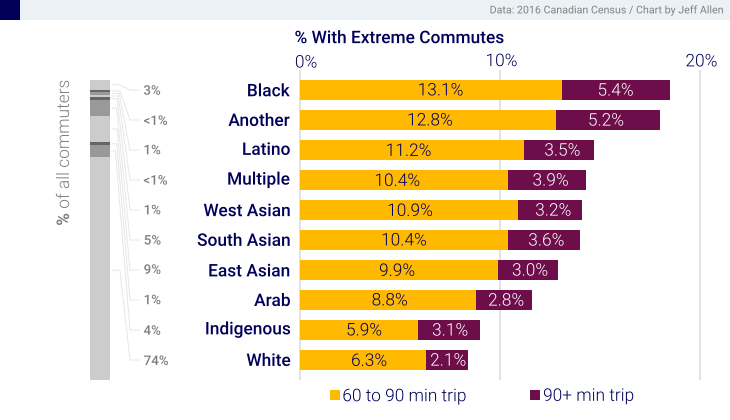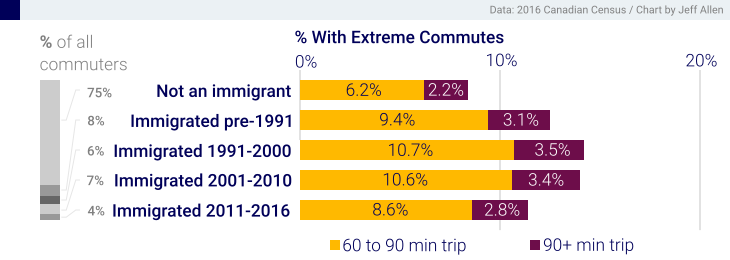Who Faces Extreme Commute Times in Canada?
There is conventional wisdom, as well as extensive academic research, that spending a long time commuting to work is undesirable. Unfortunately, some communities are far more likely to experience longer commuting times than others. High housing costs and discrimination in housing and employment are likely factors contributing to inequities in commute times.
In 2016, 9.7% of commuters in Canada experienced extreme commutes, defined by having a one-way commute greater than or equal to 60 minutes.
However, in our analysis of the 2016 census data, we find that there are stark differences in extreme commuting among different population groups across the country:



Details
- These charts are are based on the full 25% sample of the 2016 Canadian census. This includes records of over 4.5 million Canadians who reported commuting to a usual place of work.
- All data presented above are self-reported from the census except for Low-Income status which is based on the after-tax Low-Income Cutoff, derived from linked data from the Canada Revenue Agency
- The data were accessed at the Toronto Research Data Centre (RDC), operated by Statistics Canada. Only aggregated statistics, like those shown above, were released from the RDC. The released data can be downloaded here.
- We’ve also used this data to compute logistic regression models predicting the likelihood of being an extreme commuter. We found that these inequities persist, even after controlling for occupation, geography, job accessibility, and mode choice among other variables. We will be releasing the results of this analysis shortly.
- Lastly, our analysis was based on 2016 census data, back when most workers travelled to work 5 days a week. Clearly this has shifted during COVID-19. Continuing this analysis using data from 2020 onward should also look at weekly commute frequency if possible.
*The terminology on ethnicity used in this figure reflects Statistics Canada’s own Census categories, with changes made to better align the data with Ontario’s standards, though we acknowledge we were unable to align exactly to these categorizations due to limitations with our data.
You may also like
 Removing Fare Barriers: Free Public Transit for Youth Experiencing Homelessness in Toronto
Removing Fare Barriers: Free Public Transit for Youth Experiencing Homelessness in Toronto
Noah Kelly is the Director of Research & Partnerships at the Transit Access Project (TAP) and has recently completed his Master of Arts at McGill… Read More
 The Hidden Price of Clean Transportation
The Hidden Price of Clean Transportation
Lessons from the Transition to Electric School Buses The French version of this blog post is available HERE. Canada’s 51,000 school buses… Read More
 Youth Experiences with Active Transportation in Yellowknife, Northwest Territories, Canada
Youth Experiences with Active Transportation in Yellowknife, Northwest Territories, Canada
About the Prioritizing Populations Study Group My name is Alexandra Sbrocchi, and I am a rural planner and third-year PhD candidate in the School of… Read More
